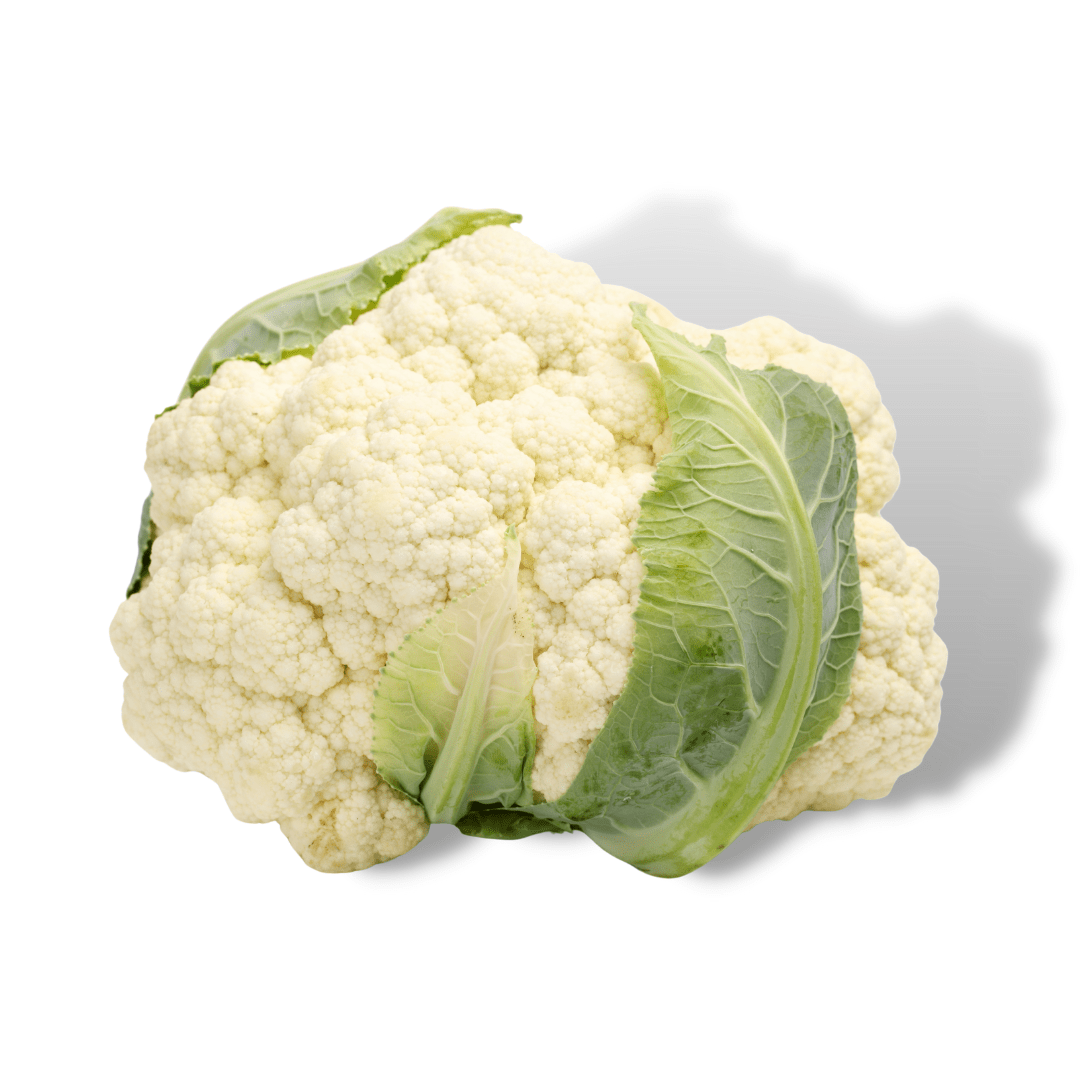About
Cauliflower is a cruciferous vegetable belonging to the Brassicaceae family, which also includes broccoli, kale, and cabbage. It has a compact, round head or curd, which is made up of tightly packed clusters of immature flower buds, and a thick, fibrous stem. The curd is the part that is commonly consumed, although the leaves and stems can also be eaten.
Health benefits of Cauliflower:
-
High in Nutrients: Cauliflower is low in calories but high in nutrients like fiber, vitamins C, K, and B6, and potassium.
-
Supports Digestive Health: The fiber in cauliflower helps to support healthy digestion by promoting regular bowel movements and preventing constipation.
-
Anti-inflammatory Properties: Cauliflower contains compounds like sulforaphane, glucobrassicin, and indole-3-carbinol which have anti-inflammatory properties and may help to reduce the risk of chronic diseases.
-
Promotes Heart Health: The fiber, potassium, and antioxidants in cauliflower may help to lower blood pressure and reduce the risk of heart disease.
-
May Help Prevent Cancer: Cauliflower contains compounds that have been shown to have anti-cancer effects, particularly in preventing the development and spread of prostate, breast, and colon cancers.
List of diseases that can be cured by consuming cauliflower:
- Diabetes
- High Blood Pressure
- Heart Disease
- Cancer
- Obesity
The energy content of Cauliflower per 50-gram serving:
Cauliflower provides 11 calories per 50-gram serving.
Macro Nutrient content of Cauliflower per 50-gram serving:
| Nutrient | Amount |
|---|---|
| Carbohydrates | 2g |
| Fats | 0.1g |
| Proteins | 1.1g |
| Fiber | 1g |
| Water Content | 45g |
The vitamin content of Cauliflower per 50-gram serving:
| Vitamin | Amount |
|---|---|
| Vitamin A | 3mcg |
| Vitamin B1 | 0.04mg |
| Vitamin B2 | 0.02mg |
| Vitamin B3 | 0.5mg |
| Vitamin B6 | 0.06mg |
| Vitamin B12 | 0mcg |
| Vitamin C | 26mg |
| Vitamin D | 0mcg |
| Vitamin E | 0.1mg |
| Vitamin K | 9mcg |
| Folate | 14mcg |
| Biotin | 1.5mcg |
The mineral content of Cauliflower per 50-gram serving:
| Mineral | Amount |
|---|---|
| Calcium | 11mg |
| Iron | 0.2mg |
| Iodine | 1mcg |
| Zinc | 0.2mg |
| Magnesium | 7mg |
| Phosphorus | 20mg |
| Potassium | 125mg |
| Sodium | 9mg |
| Chloride | 37mg |
| Copper | 0.03mg |
| Chromium | 0mcg |
| Fluoride | 4mcg |
| Molybdenum | 4mcg |
| Manganese | 0.1mg |
| Selenium | 0.4mcg |
What are the health benefits of cauliflower?
Cauliflower offers numerous health benefits, including being rich in vitamins, minerals, and antioxidants, supporting digestion, boosting immunity, and promoting heart health.
How to cook cauliflower?
Cauliflower can be roasted, steamed, stir-fried, boiled, or even mashed, offering a wide range of cooking options to suit your preferences.
Can cauliflower help with weight loss?
Yes, cauliflower is low in calories, high in fiber, and can be a great addition to a weight loss diet as it provides satiety and essential nutrients.
What nutrients are present in cauliflower?
Cauliflower is a good source of vitamin C, vitamin K, folate, and dietary fiber, along with various minerals like potassium and manganese.
Is cauliflower suitable for low-carb diets?
Absolutely! Cauliflower is low in carbohydrates and can be used as a versatile substitute for higher-carb ingredients in many dishes.
Can cauliflower be used as a rice substitute?
Yes, cauliflower can be processed into small rice-like grains, commonly known as cauliflower rice, which is a popular low-carb and gluten-free alternative.
Does cauliflower have any impact on digestive health?
Cauliflower is high in fiber, which promotes healthy digestion and helps prevent constipation, making it beneficial for digestive health.
How does cauliflower support heart health?
Cauliflower contains compounds that may help reduce the risk of cardiovascular diseases by promoting healthy cholesterol levels and supporting blood vessel health.
Can cauliflower be beneficial for brain health?
Yes, cauliflower is rich in choline, a nutrient important for brain development and function, making it beneficial for overall brain health.
Does cauliflower have any impact on skin health?
Cauliflower is packed with antioxidants and vitamins that may help protect the skin against oxidative damage and promote a healthy complexion.
Is cauliflower safe for individuals with certain allergies?
While cauliflower allergies are rare, individuals with known allergies to other cruciferous vegetables should exercise caution and consult a healthcare professional if needed.
Can cauliflower be included in a vegan or vegetarian diet?
Absolutely! Cauliflower is a versatile vegetable that can be used in a variety of plant-based dishes, providing essential nutrients and flavors.
What are the potential side effects of consuming cauliflower?
Some individuals may experience digestive discomfort, gas, or bloating when consuming large amounts of cauliflower due to its high fiber content.
How does cauliflower contribute to immune health?
Cauliflower contains immune-boosting antioxidants, vitamins, and minerals that help support a healthy immune system.
Can cauliflower be helpful in managing diabetes?
Cauliflower is low in carbohydrates and has a low glycemic index, making it a suitable choice for individuals with diabetes when incorporated into a balanced diet.
Does cauliflower have anti-inflammatory properties?
Cauliflower contains certain compounds with anti-inflammatory effects, which may help reduce inflammation and support overall health.
How does cauliflower contribute to detoxification?
Cauliflower contains compounds that support the body's natural detoxification processes, aiding in the elimination of toxins from the body.
Can cauliflower be beneficial for gut health?
Yes, cauliflower is rich in fiber, which promotes a healthy gut microbiome and supports digestive health.
How does cauliflower help with weight management
Cauliflower is low in calories and high in fiber, which can help promote satiety, reduce calorie intake, and support healthy weight management.









